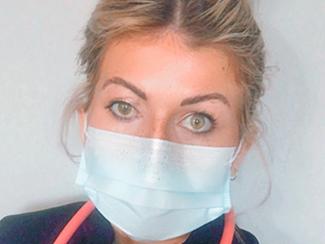GO BE A NURSE
Nurses take a day to focus on nursing shortages, job stress, burnout ... crisis

Beth McKendrick, nurse and member of United Nurses of Alberta Local 65
CANADA’S NURSES SAY THEY ARE DONE ASKING. Thousands of them rallied in every province on a Day of Action September 17 to make that plain.
They say they are done asking for fair pay, safe work, more nurses, better care.What they expect now is for the federal government to take action.
“Nurses have had enough,” says Linda Silas, president of the CFNU (Canadian Federation of Nurses Unions). “We just needed a way to express our frustration, but at the same time, some of our locals are going to be doing happy events, just to give themselves a break.”
A day to express themselves
The actions included things like marches in front of legislatures, government offices and workplaces as well as barbecues and a car cavalcade in Edmonton.
Silas says more than a decade into a chronic nursing shortage, nurses and health care staff are overworked, underpaid, burnt out, and suffering moral distress.
Silas says they needed a way to visibly express their distress. “Nurses and health care staff were overworked, before the pandemic. Now everything is worse. Nurses are just plain tired.”
Melissa, a registered nurse in Saskatchewan, tweeted: “I am working my 5th overtime shift this month. Not because I want the compensation, but because I have a day off and can help my peers. I am tired.”
Nurses and health care staff are overworked, burnt out, and suffering moral distress because there are not enough staff to provide the care patients need and deserve. Since the pandemic hit average weekly overtime has jumped to 78% and 24-hour shifts are more routine in many regions.
Worse still, in a healthcare systems reeling under a shortage of nurses of 30% or more—60% of nurses now working say they intend to leave their jobs in the next year.
Done asking
“Nurses are done asking for basic respect, safety and fairness,” says Silas. “Now we are demanding government action, and we are united to fight for the fairness we deserve.”
Silas wants the feds to gather data and undertake strategic nationwide planning initiatives to help provinces and health-care providers alleviate their staffing shortages.
“What the federal government needs to do,” she says, “is to give the tools to the provinces and territories to make the appropriate decision.”
Silas says that many hospitals and provinces, which have mostly focused on the “day-to-day” operation of the health-care system, struggle to find the resources to investigate new staffing models and other pilot projects that could help reduce some of the nursing shortages.
Feds must lead the way
The CFNU is calling for an immediate moratorium on nursing cuts, increased federal funding to retain and recruit more nurses, and a federal agency tasked with improving workforce data and ensuring Canada has enough health care workers to meet growing need.
Nurses are calling on provincial governments to end mandatory overtime, wage suppression and cancelled time off, and publicly commit to safe staffing models, fair wages, benefits and permanent work for all health care workers, especially those in long-term care.
“Without urgent action from our federal and provincial governments to fix the nursing crisis, we are headed for a health care disaster,” says Silas.
- 30 -













Add new comment